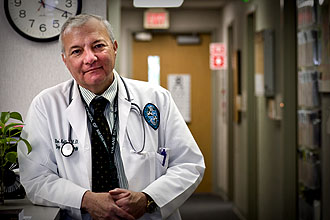Brain Research: the Final Frontier
In the past decade, there has been an explosion of medical information about the brain and new therapies for brain disorders, says neurologist Dr. Roger Kelley. Yet, as population aging increases, scientists still have a long way to go in understanding how to keep the brain functioning optimally throughout a lifetime.

The field of neurology is poised to embrace new treatments for brain disorders, says Dr. Roger Kelley, professor and chair of the Department of Neurology at the Tulane University School of Medicine. (Photo by Paula Burch-Celentano.)
“People probably won't be able to retire as early as they used to, and we have to try our best to maintain their health,” says Kelley, professor and chair of the Department of Neurology at the Tulane University School of Medicine.
This past year, Tulane launched the Department of Neurology, separate from the former Department of Psychiatry and Neurology. Advances in diagnosing and treating brain disorders are evolving so rapidly that it can be challenging for physicians to be thoroughly up-to-date with advances in both neurology and psychiatry, opines Kelley, who received his medical degree from Tulane in 1976.
“It is inspiring to participate in the development of new treatments by being involved in clinical trials,” Kelley says, citing the field of neurogenetics that targets treatment of brain disorders through therapies specifically designed to each individual's genetic make-up. This type of therapy may provide relief to millions of people.
Kelley, whose own research has focused on stroke neuroprotection preserving brain function after a stroke says doctors would like to extend the window of time immediately after a stroke, when treatment could preserve brain function.
“If you can quiet down brain metabolism when someone is having a stroke, you can protect that susceptible brain from having extension of the stroke and worse brain damage,” Kelley says.
There are about 700,000 and 750,000 new or recurrent strokes each year in the United States.
Kelley hopes to collaborate in the development of a multidisciplinary Aging Center at Tulane that will promote ways to improve cognitive status, functional independence and quality of life as the population grows older.
